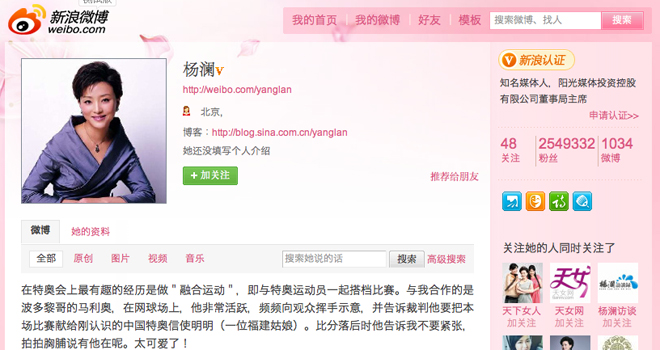An innovative Twitter-like web platform has emerged as an important new arena for Chinese politics and society.
Since its founding in 2009, Sina Weibo has grown to more than 100 million users with a combination of the familiar 140-character updates and features that make the service more advanced than Twitter in important ways.
Like all major Chinese web platforms, Sina Weibo is censored in coordination with the government, but that hasn’t stopped the service from supporting the development of a new era in Chinese public affairs.
“Weibo has become a magnifying glass on all the problems in China,” said Bill Bishop, a co-founder of CBS MarketWatch in the United States, and who now advises many Chinese start-ups. “A lot of the injustices in China aren’t necessarily new, but people are just starting to hear about them.”
Sina, the company behind Weibo (which means “micro-blog” in Chinese), has long been a leader in China’s burgeoning online sector. When Sina Weibo launched, Twitter had been blocked by the Chinese government earlier in the year, and another major competing micro-blog platform had been shut down due to unrest in China’s western Xinjiang region.
Bishop said Sina was politically astute when launching Weibo.
“My understanding is that before launching, Sina approached the Chinese government to make sure it would be OK for them to do something like Twitter,” he said.
Sina already had a popular blogging platform and had made significant progress getting celebrities to use their service. When Sina Weibo launched, many of the celebrities moved over, creating an instant audience base for the new entry.
Sina learned from the way people use Twitter. It built in threading features that allow any single message to act as a forum for discussion. User innovations have even turned Sina Weibo into a colossal dating website.
And showing that horny politicians are a phenomenon that’s universal whether in real life, online, in China or in the United States, Weibo recently hosted its own version of an Anthony Weiner moment.
A municipal official in east China recently made the news when he was discovered planning a liaison with a mistress, mistakenly believing his communications with her were private messages when in fact the whole exchange played out in public posts.
On the political front, Sina Weibo’s importance comes from the fact that it facilitates information flow among people, allowing the rapid spread of everything from celebrity gossip to complaints of official corruption.
“What Weibo has done is dramatically increase the speed and breadth of the information being spread,” Bishop told TPM. “You’ve got these pockets of very combustible situations, and it seems like Weibo is just adding gasoline to them.”
At a time when the global recession and increasing inequality in China have made issues of equity more visible, people are finding it easier to share information, despite the authorities’ attempts at control.
The government has exerted significant control over the service.
In February, when small demonstrations erupted in Chinese cities under the banner of the so-called “Jasmine Revolution,” Weibo blocked specific keywords.
There are also more recent signs of the authorities growing uncomfortable with Weibo’s rocket-fueled growth and proliferation in Chinese society.
A weekend op-ed in the China Daily, an English-language government newspaper, called for increased scrutiny of Weibo in the name of controlling rumors, which it said “can bring discredit to the innocent and cause panic or even social unrest if not clarified in time.”
Despite the tight controls, Sina has a thriving product, and has announced plans to create an English version of the service, fueling speculation that the Chinese site would try to compete with Twitter in other countries.
Bishop said such reports are “completely overblown by the Western media,” noting that Sina is in intense domestic competition with Tenecent, another Chinese company whose most prominent product is the QQ instant messaging service.
The English version, he argues, will facilitate foreign businesses wishing to create an online presence for the growing China market.
Besides, he said, Sina executives “understand the political baggage that comes with being a Chinese Internet company.”









